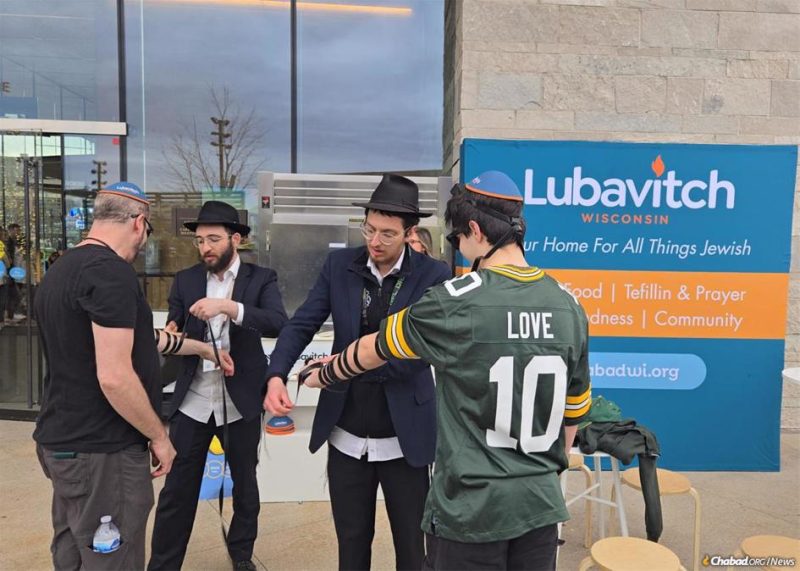
Finding Faith in Football Country During Historic Green Bay Draft
by Moshe New – chabad.org
As Green Bay, Wis., prepared to host the 2025 NFL Draft, bringing an estimated 600,000 football fans to the modest midwestern city, another preparation was quietly underway—one focused not on player selections and sports analysis, but on kosher meals and prayer services.
Green Bay’s Chabad-Lubavitch emissaries, Rabbi Michoel and Esther Feinstein, alongside the umbrella Lubavitch of Wisconsin, transformed the city’s small Jewish presence into a temporary hub of Jewish life and observance during the draft weekend, creating a Jewish draft experience.
Rabbi Feinstein, who moved to Green Bay with his family 15 years ago, detailed their preparation efforts to Chabad.org: “We began planning almost two months before the draft, even before Purim. We worked to secure a presence inside the perimeter of the ‘draft experience’ while our Chabad house served as a hospitality center.”
What made the experience all the more poignant is the location: Green Bay, a modest city of some 100,000 is home to less than 1,000 Jews. As such, it took a lot of work to prepare the necessary Jewish infrastructure visitors were looking for such as kosher food, prayer services and the like.
Football-crazy Green Bay, home to the historic NFL Packers franchise, typically sees Jewish visitors only for a handful of regular-season games each year. Feinstein recalled how his usual preparations for such fans involves hosting a few observant fans for Shabbat meals or organizing additional prayer services.
“I thought we’d have those kinds of visitors,” Feinstein admits. “But what we experienced during the draft was something completely different.” Chabad of Green Bay’s home was transformed into a hospitality center, where visitors gathered for prayer, down time as well as to pick up pre-ordered kosher meals. Additionally, the organization set up a Chabad Jewish resource booth at the site of the draft itself, allowing Jewish football fans to discover a robust Jewish presence in the heart of Packers country. Perhaps the biggest reaction was surprise.
One visitor from Baltimore turned a corner at the draft experience and spotted the Chabad booth, manned by a crew of seven young rabbinical students and members of the Chabad of the Bay Area team. His face registered first confusion, then delight. “In Green Bay?!” he exclaimed to the young rabbis.

‘We’ve Never Had Weekday Prayers Like This’
Emblematic of the success was the assembly of complete prayer quorums for all three daily prayers on Thursday of draft weekend—for Shacharit, Minchah and Maariv.
“In the 15 years we’ve been here, we’ve never had weekday prayers like this,” the rabbi said. “Not in Green Bay.”
The booth became a focal point for Jewish visitors amid the sports festivities. Aside from staffing the booth, the rabbinical students—which included three of Feinstein’s sons—circulated throughout the draft venue, offering fans the opportunity to don tefillin. Meanwhile, the booth provided kosher sandwiches and salads from Deli on Crown run by Chabad in Mequon and Friendship Circle Cafe in Wisconsin, along with ARK charity boxes, Lubavitch of Wisconsin yarmulkes, and information about prayer services.

One especially meaningful encounter involved a father and son from Madison, Wis., who were both “bar mitzvahed” at the booth. One of the rabbinical students spotted them in the crowd and invited them to put on tefillin for what turned out to be the first time in their lives.
In another memorable moment, a mother and daughter expressed delight at seeing female representatives from Lubavitch of Wisconsin at the booth. “In an environment that was highly male-dominated, they were visibly excited to connect with other women and ended up purchasing kosher food,” Feinstein said.
An Israeli vendor working at the draft experience also found unexpected assistance when he realized he had forgotten his tefillin at home—but Chabad was there to save the day.
“There are people who go to the draft for the ‘Draft Experience,’ and then there are people who go for a Jewish draft experience—that’s why we’re there,” Feinstein explained. “Their excitement for something Jewish, when they came for something not Jewish, was amazing.”














